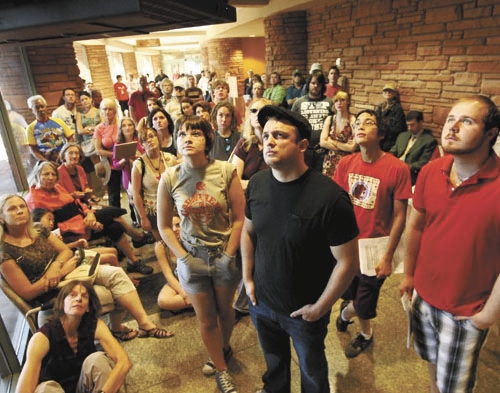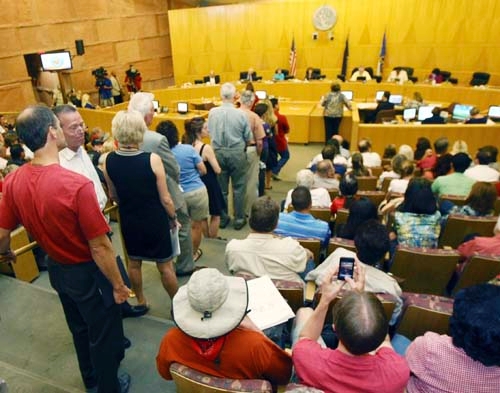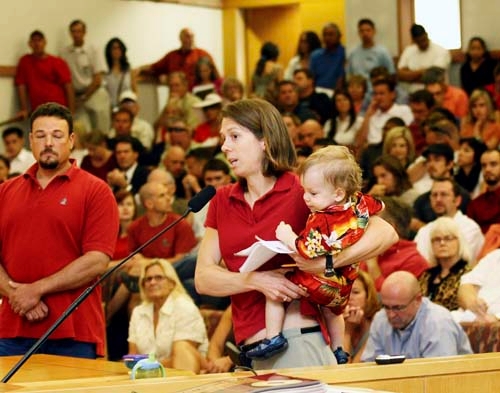Rhodes gets initial approval for Red Rock area development




An early plan for a dense hilltop development overlooking scenic Red Rock Canyon received the go-ahead Wednesday from the Clark County Commission despite strident opposition from critics who filled the government center auditorium.
Commissioners voted 5-2 to approve Jim Rhodes’ conceptual plan for roughly 4,700 homes and a business park on a former mining site overlooking the national conservation area.
County officials said it was a significant step but noted that a conceptual plan is vague and lacks details about how the project will actually take shape.
Rhodes now must tackle tasks such as site design, engineering and architecture to get the land rezoned and start construction, which is probably years away.
As in the past, Rhodes’ efforts to develop the 2,500 acres on the mesa known as Blue Diamond Hill stirred an outcry from people who worry that the project will diminish the majestic beauty of Red Rock, a popular hiking, camping, picnicking and rock-climbing area.
For much of the day, commissioners faced a crowd that spilled into the hallway. Critics far outnumbered supporters, creating a tense atmosphere.
"I oppose this project because it is incompatible with the surroundings," said Samuel Ford, whose late wife, Jean, was involved in preserving Red Rock in the 1960s.
Real estate agents, construction workers, contractors and some business owners expressed support, saying the project would give the slumping local economy a boost.
"This project is going to create a ton of jobs. … That’s exactly what this community needs," said John Timer, who runs a small business with his wife.
In the end, lawyers, not residents, appeared to sway commissioners.
Attorneys for both the county and Rhodes told commissioners they would be on shaky legal ground if they rejected the plan at this early stage.
"You have to be careful in balancing owners’ rights and balancing concerns of the community," commission Chairwoman Susan Brager said.
Brager, whose District F contains the project area, joined Commissioners Tom Collins, Larry Brown, Steve Sisolak and Mary Beth Scow in voting to let the conceptual plan go forward. Commissioners Chris Giunchigliani and Lawrence Weekly voted no.
Commissioners approved less density than the maximum 7,200 homes that Rhodes had requested.
Rhodes hopes to add another 2,000 homes on the mesa by swapping about 800 acres of land with the Bureau of Land Management.
The vote came after hours of testimony from residents. Heated emotions led to a couple testy exchanges between opponents and commissioners.
Trying to curb repetitive rants at the podium and raucous jeering, Brager told the audience that she understood their feelings but that she had to keep order.
"We get it," she said.
One man, though, said he and others in the room didn’t think she got it. His taunt spurred derisive laughter.
Brager and Giunchigliani chided him, saying personal attacks were uncalled for.
"I don’t need defending," Brager said. "The attacks can go on. You wouldn’t like it if you sat up here."
Eight years ago, county commissioners decided to limit the density on Rhodes’ land to one home for every two acres. The state passed a statute mirroring the county’s code.
Rhodes later filed a lawsuit challenging the restrictions.
Last year, a federal judge struck down the state law and was preparing to rule on the county’s code. That prompted commissioners to vote 4-3 to let Rhodes request higher-density use. Under the settlement, Rhodes can apply for "major projects" at least 700 acres in size, and the county can reject any proposals.
Still, to deny Rhodes’ plan now, the county would have to back up that action in court with facts supporting the contention that the project should not be built and not simply point to public sentiment being against the project, said Rob Warhola, deputy district attorney.
The county has no solid data showing the project will hurt Red Rock, he said, adding that people’s feelings carry no legal weight.
However, Giunchigliani argued that Rhodes has failed to show how he would supply the isolated, hilltop site with water and other utilities and how he could sell thousands of homes in a depressed market with a glut of houses.
The county could argue that this is not a viable plan, Giunchigliani said. "It doesn’t make sense. They brought us a concept that doesn’t work."
Ron Krater, Rhodes’ planner, spoke in holistic terms, saying the project could be developed so it’s in "harmony with environment" and has a "healthy global responsibility."
Offices, cafes, stores, galleries, an amphitheater and college campus would surround a town square or plaza where people could gather, Krater said.
Homes would be clustered in villages, Krater said. The densest area would be at the center and would be shrouded by nearby hills and mesas.
The clusters would become less dense as they got closer to the cliff’s edge to make them less visually intrusive, Krater said.
Rob Mrowka, an environmentalist, praised the plan that Krater helped craft, saying it would work well in the urban core but not near Red Rock.
"It’s a wonderful plan but in the wrong place," Mrowka said.
Contact reporter Scott Wyland at swyland@review journal.com or 702-455-4519.












